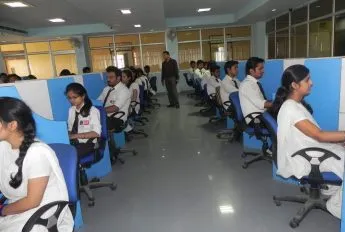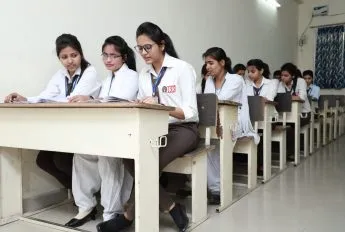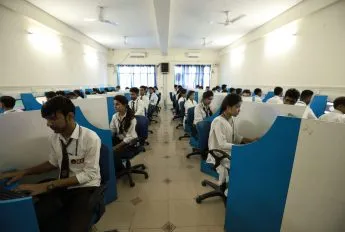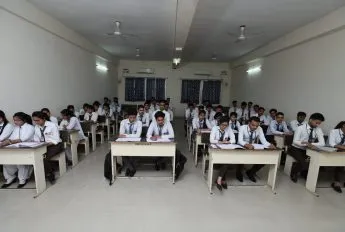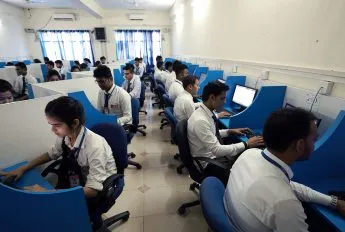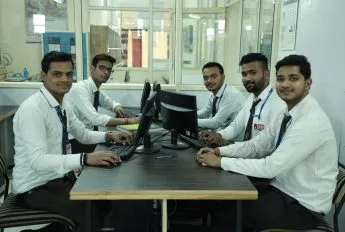-
- About the Department
- Vision
- Mission
- Program Educational Objectives (PEOs)
- Program Outcome (POs)
- Program Specific Outcomes (PSOs)
- Faculty Of Computer Science Engineering
- Magazines
- Syllabus & Course Outline
- Laboratories
- Practices & Innovation in Teaching Learning
- Professional Society
- Departmental Activities(Guest Lectures & Industrial Visits)
- Academic Calendar
- Project
- Research & Development
Department of Computer Science Engineering (CSE)
The Department of Computer Science Engineering (CSE) at R.R. Group of Institutions (RRGI) is committed to delivering top-quality education and fostering innovation in the rapidly advancing field of computer science. CSE encompasses a wide range of topics, including the analysis of algorithms, programming languages, program design, software development, and computer hardware. It integrates foundational concepts from electrical engineering, mathematics, and linguistics, ensuring that students are well-prepared to tackle complex challenges in the world of technology.
At RRGI, we take pride in offering state-of-the-art infrastructure, including fully equipped labs, to provide students with hands-on experience that complements their theoretical learning. To keep our students ahead of the curve, we regularly organize workshops, industrial tours, and guest lectures by industry experts. This exposure equips our students with the latest tools and technologies that are in high demand across the globe, making them well-prepared for the ever-evolving tech industry.
Our Computer Science Engineering program has deep roots in both engineering and mathematics, and its evolution from a field taught within the domains of electrical engineering to a standalone discipline reflects its growing importance in shaping the future. The B.Tech in Computer Science Engineering at RRGI has been designed with the changing landscape of technology in mind. Over the years, we have consistently focused on providing students with the most relevant and up-to-date knowledge, ensuring that they become industry-ready professionals with a strong foundation in both theoretical concepts and practical application.
The results speak for themselves. Our CSE students have consistently secured top placements with leading IT companies such as Wipro, Accenture, Capgemini, Zensar, and many more. Thanks to the rigorous training, industry exposure, and emphasis on innovation, RRGI CSE graduates are among the most sought-after professionals in the IT industry, often securing lucrative job packages upon graduation.
With a team of highly qualified faculty, cutting-edge infrastructure, and a forward-thinking curriculum, the CSE Department at RRGI is the ideal place for students who wish to thrive in the world of computer science and technology.
Vision
To establish a scientific & technical environment which imparts quality education to achieve excellence in the field of Computer Science & Engineering to cater for the evolving needs of the industry andsociety by maintaining human values, morals and ethics.
Mission
- M1-To provide quality education in the field of Computer Science & Engineering through state of art infrastructure and by adoptinghigh-quality academic practices which enable our students to meet the demands of academia, industry, nation and the world at large.
- M2-Tomotivate students for higher studies, employability and research activities associated with the field of Computer Science and Engineeringfor the betterment of society.
- M3-To induce students with professional behaviour, leadership, ethics, morality and Indian values.
Program Educational Objectives (PEOs)
- PEO1:- Graduate of the program will be able to apply theoretical and technical principles of Computer Science & Engineering to analyze and provide innovative solutions toreal-life problems.
- PEO2:- Graduate of the program will be technically and professionally competent for employability, research & development, higher education and entrepreneurshipwith a zeal for continuous learning in the field of Computer Science& Engineeringand related domains.
- PEO3:- Graduate of the program will be able to work individually as well as in teams with sound communicational skills.
Program Outcome (POs)
Engineering knowledge
Apply the knowledge of mathematics, science, engineering fundamentals, and an engineering specialization to the solution of complex engineering problems.
Problem analysis
Identify, formulate, review research literature, and analyse complex engineering problems reaching substantiated conclusions using first principles of mathematics, natural sciences, and engineering sciences.
Design/development of solutions
Design solutions for complex engineering problems and design system components or processes that meet the specified needs with appropriate consideration for the public health and safety, and the cultural, societal, and environmental considerations.
Conduct investigations of complex problems
Use research-based knowledge and research methods including design of experiments, analysis and interpretation of data, and synthesis of the information to provide valid conclusions.
Modern tool usage
Create, select, and apply appropriate techniques, resources, and modern engineering and IT tools including prediction and modelling to complex engineering activities with an understanding of the limitations.
The engineer and society
Apply reasoning informed by the contextual knowledge to assess societal, health, safety, legal and cultural issues and the consequent responsibilities relevant to the professional engineering practice.
Environment and sustainability
Understand the impact of the professional engineering solutions in societal and environmental contexts, and demonstrate the knowledge of, and need for sustainable development.
Ethics
Apply ethical principles and commit to professional ethics and responsibilities and norms of the engineering practice.
Individual and teamwork
Function effectively as an individual, and as a member or leader in diverse teams, and in multidisciplinary settings.
Communication
Communicate effectively on complex engineering activities with the engineering community and with society at large, such as, being able to comprehend and write effective reports and design documentation, make effective presentations, and give and receive clear instructions.
Project management and finance
Demonstrate knowledge and understanding of the engineering and management principles and apply these to one’s own work, as a member and leader in a team, to manage projects and in multidisciplinary environments.
Life-long learning
Recognize the need for, and have the preparation and ability to engage in independent and life-long learning in the broadest context of technological change.
Program Specific Outcomes (PSOs)
- PSO1- The graduates should have the excellent capability to solvereal-world problems by designing & developing methodologies, computer programs, software & system and excel in emerging areas like artificial intelligence, algorithm, network & securities and web applications with the help of available tools, technologies and resources.
- PSO2-The graduates should have the ability to apply multidisciplinary approaches to formulate and develop products based on existing knowledge and research to fulfil the requirement of automation for the industry and societal real problems in the computational domain.
Faculty Of Computer Science Engineering
| Name of the Faculty | Designation | Department | Highest Qualification |
| NEHA SINGH | ASST PROFESSOR (HOD) | COMPUTER SCEINCE & ENGINEERING | M TECH |
| SURYA PRAKASH TRIPATHI | PRINCIPAL/DIRECTOR | COMPUTER SCEINCE & ENGINEERING | PHD |
| SANTOSH KUMAR | PROFESSOR | COMPUTER SCEINCE & ENGINEERING | PHD |
| SANJEEV SINGH | ASST PROFESSOR | COMPUTER SCEINCE & ENGINEERING | M TECH |
| VINOD KUMAR VERMA | ASST PROFESSOR | COMPUTER SCEINCE & ENGINEERING | M TECH |
| SIDDHARTA DWIVEDI | ASST PROFESSOR | COMPUTER SCEINCE & ENGINEERING | M TECH |
| VARTIKA GUPTA | ASST PROFESSOR | COMPUTER SCEINCE & ENGINEERING | M.TECH |
| MANISH MAURYA | ASST PROFESSOR | COMPUTER SCEINCE & ENGINEERING | M TECH |
| MANOJ KUMAR | ASST PROFESSOR | COMPUTER SCEINCE & ENGINEERING | M TECH |
| DEEPSHIKHA | ASST PROFESSOR | COMPUTER SCEINCE & ENGINEERING | M TECH |
| RANJANA | ASST PROFESSOR | COMPUTER SCEINCE & ENGINEERING | M TECH |
| AJAY KUMAR GUPTA | ASST PROFESSOR | COMPUTER SCEINCE & ENGINEERING | M TECH |
| ANIL KUMAR VERMA | ASST PROFESSOR | COMPUTER SCEINCE & ENGINEERING | M TECH |
| EESHA MISHRA | ASST PROFESSOR | COMPUTER SCEINCE & ENGINEERING | M TECH |
| MOHIT SRIVASTAVA | ASST PROFESSOR | COMPUTER SCEINCE & ENGINEERING | M TECH |
| NAJEEBUL HASAN | ASST PROFESSOR | COMPUTER SCEINCE & ENGINEERING | M TECH |
| NIRENDRA TIWARI | ASST PROFESSOR | COMPUTER SCEINCE & ENGINEERING | M TECH |
| SANDEEP KUMAR | ASST PROFESSOR | COMPUTER SCEINCE & ENGINEERING | M TECH |
| SHIVANI SHARMA | ASST PROFESSOR | COMPUTER SCEINCE & ENGINEERING | M TECH |
| SUJEET SINGH | ASST PROFESSOR | COMPUTER SCEINCE & ENGINEERING | M TECH |
| SUPRIYA MISHRA | ASST PROFESSOR | COMPUTER SCEINCE & ENGINEERING | M TECH |
| SWAPNIL MISHRA | ASST PROFESSOR | COMPUTER SCEINCE & ENGINEERING | M TECH |
| VARTIKA GUPTA | ASST PROFESSOR | COMPUTER SCEINCE & ENGINEERING | M TECH |
| YOGESH PAL | ASST PROFESSOR | COMPUTER SCEINCE & ENGINEERING | M TECH |
| PRAVIN MISTRY | ASST PROFESSOR | COMPUTER SCEINCE & ENGINEERING | M TECH |
| SUJIT KUMAR | ASST PROFESSOR | COMPUTER SCEINCE & ENGINEERING | M TECH |
| SHIKHA SINGH | ASST PROFESSOR | COMPUTER SCEINCE & ENGINEERING | PHD |
| SHWETA DWIVEDI | ASST PROFESSOR | COMPUTER SCEINCE & ENGINEERING | PHD |
| BHARTI MALL | ASST PROFESSOR | COMPUTER SCEINCE & ENGINEERING | M TECH |
| NIDHI SHUKLA | ASST PROFESSOR | COMPUTER SCEINCE & ENGINEERING | M TECH |
| ASHEESH KUMAR DWIVEDI | ASST PROFESSOR | COMPUTER SCEINCE & ENGINEERING | M TECH |
| MANIKANT SHARMA | ASST PROFESSOR | COMPUTER SCEINCE & ENGINEERING | M TECH |
| ANCHAL SRIVASTAVA | ASST PROFESSOR | COMPUTER SCEINCE & ENGINEERING | M TECH |
Syllabus & Course Outline
Laboratories
The Labs established by the department are as follows :
- Computer Networking Lab
- Numerical Technique Lab
- Software Engineering Lab
- Compiler Design Lab
- Artificial Intelligence/Distributed System Lab
- Design & Analysis Of Algorithms Lab
- Internet Lab
- Java Programming Lab
Duties of a Computer Science Engineer
- Design and develop software application for different industries
- Manages the software, hardware & networks in any industry
- Involves in the design and development of the hardware components of PCs & laptops
- Develop software for peripheral computing devices such as printers, modems and scanners
- Writes code and algorithms for operating systems like Windows, Linux, etc.
As the leading Computer Science college in Lucknow, R.R. Group of Institutions (RRGI) has strived consistently to create an atmosphere of uninhibited learning and practical application of curricula for the students of our B.Tech Computer Science Department.
Careers
-
- Software Developers: Software developers are professionals who are concerned with facets of the software development process, which involves activities such as design and coding, computer programming, project management, etc.
- Hardware Engineers: These professionals do research, design, develop, test, and oversee the installation of computer hardware which inter alia includes computer chips, circuit boards, systems, modems, keyboards, and printers.
- System Designer: Professionals involved in system design, Logical & Physical design, wherein logical design can be enumerated as the structure & characteristics such as output, input, files, databases, procedures, etc.
- System Analyst: Computer engineers who work as systems analyst do research about the existing problems and plan solutions for them. They also recommend software and system-related problems and coordinate development between business development teams.
- Networking Engineers: Networking engineers are computer professionals involved in the design, implementation, and troubleshooting of computer networks.
- DBA: DBAs, or Database administrators, are the professionals who are bestowed with the job to designing, implementing, maintaining, and repairing an organization’s database. Inter alia, DBA professionals are also known as Database Coordinator or Database Programmer in IT sector.
Practices & Innovation in Teaching Learning
RRIMT adopts a comprehensive and student-centered approach to teaching and learning, ensuring that our students are equipped with both the theoretical foundation and practical skills necessary to succeed in the competitive field of software development. Our teaching-learning methodologies are designed to promote critical thinking, problem-solving, hands-on experience, and industry relevance.
- Student-Centered Learning Approach
We follow a student-centered approach that encourages active participation, deep learning, and collaborative efforts. This methodology aligns with the current trends in education and enhances the overall learning experience by promoting greater engagement with the subject matter.
-
-
- Interactive Lectures
-
-
-
- Project-Based Learning
-
- Blended Learning
A combination of traditional classroom learning and online resources is employed to cater to different learning styles and preferences. Blended learning ensures that students not only grasp foundational concepts but also have access to additional learning material such as online tutorials, videos, and software development tools.
-
-
- e-Learning Platforms
-
-
-
- Flipped Classroom Model
-
- Hands-On Learning
In the software branches, practical learning is at the core of our methodology. We provide students with the necessary tools, platforms, and environments to apply the concepts they learn in real-time.
-
-
- Laboratory Work
-
-
-
- Industry Tools & Software
-
- Collaborative Learning and Peer Interaction
We emphasize collaborative learning, where students work in teams, mimicking industry settings. This approach develops their interpersonal and communication skills, both of which are crucial in the software development field.
-
-
- Group Projects and Hackathons
-
-
-
- Peer Review & Code Sharing
-
- Industry-Institute Interface
A key element of our teaching-learning methodology is maintaining close ties with the industry. This ensures that students are exposed to the latest trends, tools, and technologies used in the software industry.
-
-
- Industrial Visits
-
-
-
- Guest Lectures and Workshops
-
-
-
- Internships
-
- Continuous Assessment and Feedback
Assessment is an ongoing process designed to evaluate both theoretical understanding and practical skills development.
-
-
- Formative Assessments: Regular quizzes, assignments, presentations, and coding challenges assess students’ understanding and progress throughout the course.
- Summative Assessments: At the end of each semester, students undergo final exams and major projects to demonstrate their competency in software engineering concepts.
- Feedback Mechanisms: Continuous feedback from faculty, industry mentors, and peer reviews is incorporated to guide students and improve their performance.
-
- Industry-Relevant Curriculum
The curriculum is designed to match the current needs and trends of the software industry, ensuring that students are well-prepared to tackle real-world software engineering challenges.
-
-
- Modular Approach
-
-
-
- Capstone Projects
-
- Outcome-Based Education (OBE)
Our teaching-learning methodology is in line with the Outcome-Based Education (OBE) framework, which focuses on the outcomes and results of the learning process. The curriculum and teaching methods are aligned with specific program outcomes (POs) and program educational objectives (PEOs), ensuring that graduates meet the professional, ethical, and technical expectations of the software industry.
At R.R. Group of Institutions, we are committed to delivering a high-quality education in Software Engineering through an innovative and effective teaching-learning methodology. Our approach integrates theoretical knowledge with practical experience, ensuring that our students are not only prepared to meet the challenges of the industry but also equipped to lead and innovate in the evolving field of software development.
- Address
NH-24, Bakshi Ka Talab, Sitapur Road, Lucknow-226201 (UP) India - Phone
8756008853, 9161888853, 18001020833 (Toll Free) - Email
admissions@rrgi.in - rrimtedu@gmail.com
Department of Computer Science & Engineering
Computer Science Engineering (CSE) encompasses a variety of topics that relates to computation, like analysis of algorithms, programming languages, program design, software, and computer hardware.
Computer Science engineering has roots in electrical engineering, mathematics, and linguistics. In the past Computer Science was taught as part of mathematics or engineering departments & in recent days it has emerged as a separate engineering field. Ever since its inception, B.Tech Computer Science colleges in Lucknow have been attempting to produce graduate that defines expectations and create extraordinary opportunities in the field of Computer Science.
Vision
To establish a scientific & technical environment that imparts quality education to achieve excellence in the field of Computer Science & Engineering to cater the evolving needs of the industry and the society by maintaining human values, moral and ethics.
Vision
- To provide quality education through state of art infrastructure and by adopting high quality academic practices which enable our students to meet demands of academia, industry, nation and the world at large.
- To motivate students for higher studies, employability and research activities for the betterment of society.
- To induce students with professional behaviour, leadership, ethics, morality and Indian values.
Program Educational Objectives (PEOs)
- Graduate of the program will be able to apply fundamental and technical knowledge to analyze and provide innovative solutions to the real life problems.
- Graduate of the program will be technically and professionally competent for employability, research & development, higher education and entrepreneurship with a zeal for continuous learning.
- Graduate of the program will be able to work individually as well as in group with sound communicational skills.
Program Outcome (POs)
Identify, formulate, review research literature, and analyse complex engineering problems reaching substantiated conclusions using first principles of mathematics, natural sciences, and engineering sciences.
Design solutions for complex engineering problems and design system components or processes that meet the specified needs with appropriate consideration for the public health and safety, and the cultural, societal, and environmental considerations.
Use research-based knowledge and research methods including design of experiments, analysis and interpretation of data, and synthesis of the information to provide valid conclusions.
Create, select, and apply appropriate techniques, resources, and modern engineering and IT tools including prediction and modelling to complex engineering activities with an understanding of the limitations.
Apply reasoning informed by the contextual knowledge to assess societal, health, safety, legal and cultural issues and the consequent responsibilities relevant to the professional engineering practice.
Understand the impact of the professional engineering solutions in societal and environmental contexts, and demonstrate the knowledge of, and need for sustainable development.
Apply ethical principles and commit to professional ethics and responsibilities and norms of the engineering practice.
Function effectively as an individual, and as a member or leader in diverse teams, and in multidisciplinary settings.
Communicate effectively on complex engineering activities with the engineering community and with society at large, such as, being able to comprehend and write effective reports and design documentation, make effective presentations, and give and receive clear instructions.
Demonstrate knowledge and understanding of the engineering and management principles and apply these to one’s own work, as a member and leader in a team, to manage projects and in multidisciplinary environments.
Recognize the need for, and have the preparation and ability to engage in independent and life-long learning in the broadest context of technological change.
PROGRAM SPECIFIC OUTCOME (PSOs)
- The graduates should have the excellent capability to solve the problems and do the innovation in the area of algorithm, data sciences, network & securities, deep learning and web application with the help of available tools, technologies and resources.
- The graduates should have ability to apply multidisciplinary approaches to formulate and develop products based on existing knowledge and research for the industry and societal real problems.

DR. BHAWESH KUMAR THAKUR
ASSOCIATE PROFESSOR&HEAD(Ph.D.)

MR. AJAY GUPTA
ASSISTANT PROFESSOR (M. Tech)

MR. PRAVEEN KUMAR TRIPATHI
ASSISTANT PROFESSOR (M. Tech)

PROF.(DR.) SURYA PRAKASH TRIPATHI
DIRECTOR & PROFESSOR (Ph.D.)

MR. SHIVAM KUMAR SRIVASTAVA
ASSISTANT PROFESSOR (M. Tech)

MR. ROHITASHWA PANDEY
ASSISTANT PROFESSOR (M. Tech)

MR. HANNAN ANSARI
ASSISTANT PROFESSOR (M. Tech)

MR.RAM KAILASH GUPTA
ASSISTANT PROFESSOR (M. Tech)

MS. DIPTI RANJAN
ASSISTANT PROFESSOR (M. Tech)

MR. ANURAG SRIVASTAVA
ASSISTANT PROFESSOR (M. Tech)

MR. HARI KRISHNA MISHRA
ASSISTANT PROFESSOR (M. Tech)

MR. RAJESH SINGH
ASSISTANT PROFESSOR (Ph.D.)
Duties of a Computer Science Engineer
- Design and develop software application for different industries
- Manages the software, hardware & networks in any industry
- Involves in the design and development of the hardware components of PCs & laptops
- Develop software for peripheral computing devices such as printers, modems and scanners
- Writes code and algorithms for operating systems like Windows, Linux, etc.
As the leading Computer Science college in Lucknow, R.R. Group of Institutions (RRGI) has strived consistently to create an atmosphere of uninhibited learning and practical application of curricula for the students of our B.Tech Computer Science Department.
The Labs established by the department are as follows :
- Computer Networking Lab
- Numerical Technique Lab
- Software Engineering Lab
- Compiler Design Lab
- Artificial Intelligence/Distributed System Lab
- Design & Analysis Of Algorithms Lab
- Internet Lab
- Java Programming Lab
Careers
- Software Developers: Software developers are professionals who are concerned with facets of the software development process, which involves activities such as design and coding, computer programming, project management, etc.
- Hardware Engineers: These professionals do research, design, develop, test, and oversee the installation of computer hardware which inter alia includes computer chips, circuit boards, systems, modems, keyboards, and printers.
- System Designer: Professionals involved in system design, Logical & Physical design, wherein logical design can be enumerated as the structure & characteristics such as output, input, files, databases, procedures, etc.
- System Analyst: Computer engineers who work as systems analyst do research about the existing problems and plan solutions for them. They also recommend software and system-related problems and coordinate development between business development teams.
- Networking Engineers: Networking engineers are computer professionals involved in the design, implementation, and troubleshooting of computer networks.
- DBA: DBAs, or Database administrators, are the professionals who are bestowed with the job to designing, implementing, maintaining, and repairing an organization’s database. Inter alia, DBA professionals are also known as Database Coordinator or Database Programmer in IT sector.
